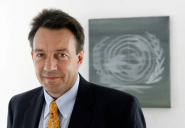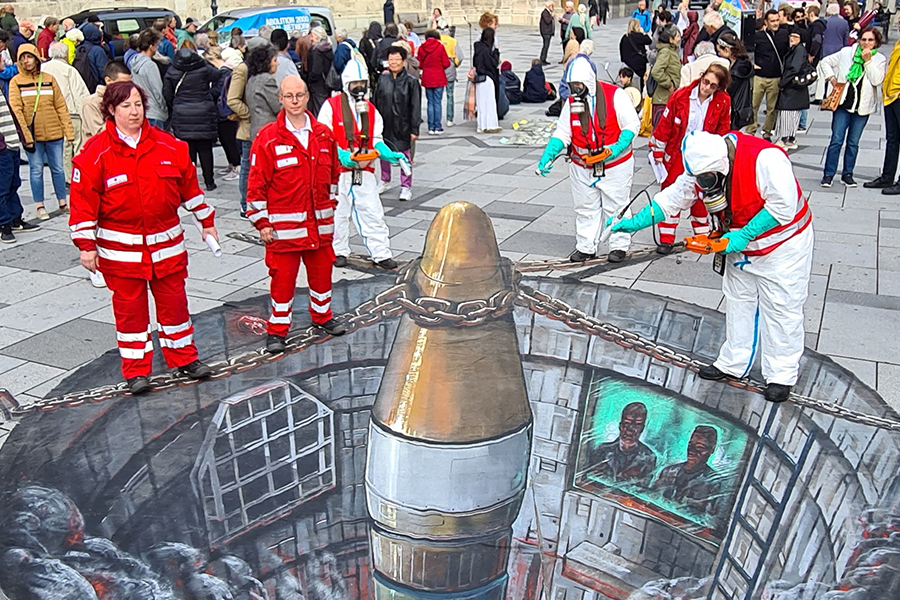Summary Report
 |
|
| (L-R): Jonathan Granoff, President of the Global Security Institute; H.E. Libran Cabactulan, Permanent Representative of the Philippines to the United Nations; former UN Under-Secretary General Jayantha Dhanapala; UN High Representative for Disarmament Sergio Duarte; and Senator Douglas Roche, MPI Interim Chairman |
September 20, 2010 –Three world experts in nuclear disarmament, Libran Cabactulan, Sergio Duarte and Jayantha Dhanapala, called for a rapid start to discussions for a Nuclear Weapons Convention at the conference, From Aspiration to Reality: Nuclear Disarmament after the NPT Review, co-sponsored by the Middle Powers Initiative and the Swiss Federal Department of Foreign Affairs, in Geneva September 14-15.
Peter Maurer, Swiss State Secretary for Foreign Affairs, said that insisting on “the inherently inhuman nature of nuclear weapons…will help prepare the ground” for outlawing them. He called on the nuclear weapons states to make “credible commitments” to complete nuclear disarmament, “What we need is real, irreversible progress. And such progress is credible only if states enter into legally binding commitments. It is time to outlaw nuclear weapons. And we need to outlaw them for all states –not just for some.”
 |
|
|
Peter Maurer, Swiss State Secretary for Foreign Affairs
|
“The time to act on a Nuclear Weapons Convention is now,” said Ambassador Cabactulan, who presided at the 2010 Review Conference of the Non-Proliferation Treaty (NPT). The Review Conference drew attention to the UN Secretary-General’s proposals for nuclear disarmament, including negotiations on a Nuclear Weapons Convention, which would be a global law banning all nuclear weapons. Ambassador Cabactulan added: “The Conference on Disarmament…should commence discussions on nuclear disarmament and a Nuclear Weapons Convention in the subsidiary body that should be established soonest.”
High Representative Duarte, who heads the UN Office for Disarmament Affairs, told the MPI meeting it is “baffling” how a Nuclear Weapons Convention could be considered by some governments as “premature” when, in fact, “global nuclear disarmament was an agreed goal on the first resolution adopted by a the General Assembly in January, 1946.”
Ambassador Dhanapala, who was President of the 1995 Review and Extension Conference of the NPT, said the achievement of a Nuclear Weapons Convention “must be high on the agenda of all governments.”
Ambassador Dhanapala co-chaired the MPI consultation with Ambassador Jürg Lauber, Permanent Representative of Switzerland to the Conference on Disarmament. The consultation, co-sponsored by MPI and the Swiss Federal Department of Foreign Affairs, was held at the International Conference Centre, Geneva, and was attended by the representatives of 25 states.
Following the consultation, Hon. Douglas Roche, O.C., Interim Chairman of MPI, announced MPI is currently planning to convene a special meeting in 2011 of governments interested in ways to proceed towards a Nuclear Weapons Convention. “We have moved past the stage of debating whether there should be a global ban on nuclear weapons,” Senator Roche said. “From the Secretary-General of the UN to a majority of public opinion in many states, there is a growing demand that this process be started. The Middle Powers Initiative will contribute to moving this subject forward.”
The MPI Geneva consultation examined the application of international humanitarian law to nuclear weapons, a key element of the humanitarian imperative for nuclear disarmament. Christine Beerli, Vice-President, International Committee of the Red Cross, Dr. Patricia Lewis, Monterey Institute of International Studies, and Dr. John Burroughs, International Association of Lawyers Against Nuclear Arms, addressed the consultation on this subject and the delegitimization of nuclear weapons more broadly. Ms. Beeli stated the Red Cross view: “Preventing the use of nuclear weapons requires fulfillment of existing obligations to pursue negotiations aimed at prohibiting and completely eliminating such weapons through a legally binding international treaty.”
There were two special panels on the Middle East. One, titled Fulfilling the Middle East Decision, featured Hisham Badr, the Permanent Representative of Egypt to the United Nations and Other Specialized Organizations in Geneva. The other was titled Regional Security in the Middle East and featured Jeremy Issacharoff, Ambassador-at-Large for Strategic Affairs for Israel. Both panels were chaired by Jonathan Granoff, President of GSI, with Ambassador Libran Cabactulan as Respondent.
For the first time at an MPI meeting, a panel was dedicated to hearing the views of the nuclear weapons states. Ambassador Eric Danon of France, Ambassador Laura Kennedy of the United States, Ambassador Victor Vasiliev of Russia, and Mr. Wang Chang of China spoke; Ambassador John Duncan of the UK was prevented by an emergency from attending.
Dr. Christian Schoenenberger, Head, Task Force on Nuclear Disarmament and Non-Proliferation, Switzerland, hailed the MPI consultation as a vital gathering of informed opinion and said Switzerland would continue to play a special role in facilitating progress towards legal instruments banning all nuclear weapons.
A full report of the MPI Geneva Consultation will be published shortly.
Resources from the Geneva Consultation
- Conference Program
- Briefing paper, The Humanitarian Imperative for Nuclear Disarmament
- Photo Gallery
- Transcripts:
» Chairman Emeritus Douglas Roche
» Ambassador Jürg Lauber, Permanent Representative of Switzerland to the Conference on Disarmament
» Ambassador Libran Cabactulan, President of the 2010 NPT Review Conference
![]()
Jonathan Granoff is the President of the Global Security Institute, a representative to United Nations of the World Summits of Nobel Peace Laureates, a former Adjunct Professor of International Law at Widener University School of Law, and Senior Advisor to the Committee on National Security American Bar Association International Law Section.








